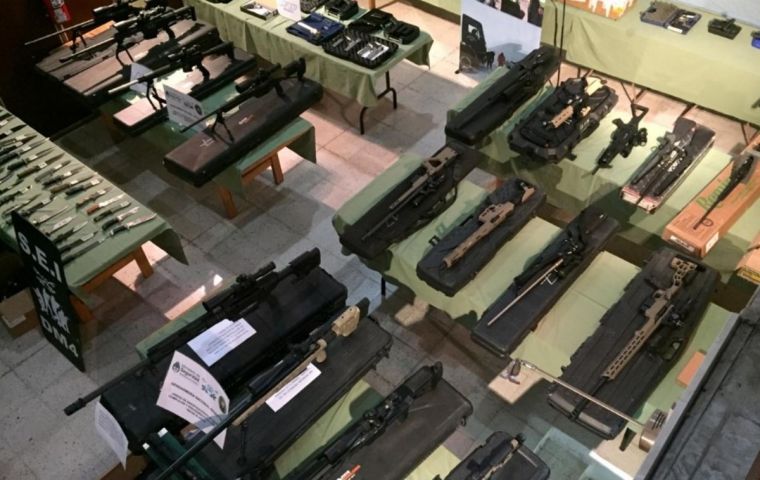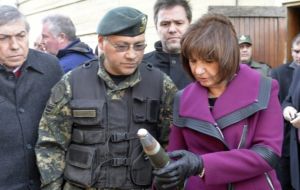MercoPress. South Atlantic News Agency
The transnational investigation behind Argentina's largest seizure of weapons
 The variety and number of weapons seized underscores how lethal and heavily armed Brazilian drug trafficking gangs have become
The variety and number of weapons seized underscores how lethal and heavily armed Brazilian drug trafficking gangs have become  “These are organizations that need weapons that are more sophisticated than what the common criminal would use,” Minister Patricia Bullrich said
“These are organizations that need weapons that are more sophisticated than what the common criminal would use,” Minister Patricia Bullrich saidAfter months of joint investigations with the United States, Argentina last week made the largest weapons seizure in the country’s history. Details of the bust and transnational investigation are coming to light sparked by a couple of packages that caught the attention of customs officers in Miami last October.
More than 2,500 firearms were recovered including mines, anti tank rockets and grenades, which apparently were heading for gangs in Brazil. Officials said some of the arms came from Germany, the Netherlands and Spain. They said they had not yet established how many of the weapons were made in the United States.
The discovery of the arsenals comes in the midst of a heated debate over public safety policy in Brazil. Gangs are facing an intensifying crackdown by the police. It also comes as the
Trump administration is trying to loosen arms export regulations and give Congress less visibility and oversight over foreign arms sales — initiatives that Democrats on Capitol Hill are fighting.
Gun control advocates say that if the efforts in both countries succeed, the measures will be a boon for criminal organizations.
“It would exacerbate the problem of guns ending in the hands of unsavory characters across the globe,” said Kristen Rand, the legislative director for the Violence Policy Center in Washington, which advocates for tighter regulations.
The variety and number of weapons seized underscores how lethal and heavily armed Brazilian drug trafficking gangs have become.
“These are organizations that have the need for weapons that are more sophisticated than what the common criminal would use,” Patricia Bullrich, Argentina’s public security minister said in an interview.
The investigation began last October, when officials at a shipping facility in the Doral area of Miami inspected two identical large boxes that had labels indicating they contained secondhand sporting goods, according to a federal criminal complaint filed this week.
After customs officers discovered that the packages contained nearly 100 parts for rifles of the AR-15 line, including trigger kits and pistol grips, American officials notified their Argentine counterparts and agreed to covertly track the boxes to their destination in Argentina.
American officials hailed the bust as a significant strike against criminal groups that have tens of thousands of foot soldiers in Brazil, one of the largest cocaine consumer markets and an important transit point for drugs smuggled to Europe.
“These weapons, when they hit South America, usually hit at a significant markup,” Anthony Salisbury, the special agent in charge of Homeland Security Investigations in Miami told reporters. “Who’s going to be able to afford that kind of markup, especially if you’re a criminal? It’s going to be these cartels, criminal organizations.”
Surveillance video from a Bradenton, Fla., post office where the packages were dropped off led investigators to a couple in their 60s who have ties to Argentina, according to law enforcement officials.
Federal prosecutors charged the couple, John James Peterson, 60, and Brunella Zuppone, 67, with conspiracy and an illegal attempt to export arms. The charging document, which was filed this week, says the two acknowledged to investigators that they had previously shipped weapons unlawfully to the South American country.
As officials in Argentina followed up on leads from their American counterparts, they identified a handful of arms smugglers that appeared to have stumbled into the trade as gun enthusiasts — an anomaly in a country where guns are tightly regulated.
“We don’t have the same philosophy of the Second Amendment as in the U.S.,” said Ms. Bullrich, the Argentine public security minister. “We try to make sure that the population at large does not have weapons.”
“We believe that a disarmed population is better and that there must be a monopoly of weapons in the hands of the security forces,” she added.
As they carried out 52 raids across the country, Argentine officials were aghast by the size and range of the arsenal they found. The arsenal is worth an estimated US$200 million, according to Argentine officials.
Military experts were on hand at a news conference in Buenos Aires where officials displayed rounds of artillery, sniper rifles and other weapons.
Minister Bullrich said Argentine investigators believe the weapons smugglers there were not directly linked to the Brazilian groups.
“There is a group of people who saw an economic opportunity in a hobby that they had,” Ms. Bullrich said.
Once the arms were assembled in Argentina, some in secret bunkers in ordinary homes, they were shipped by land to Paraguay, which shares a porous border with Brazil, according to the authorities.
Brazil’s main drug-trafficking organizations, the First Capital Command and the Red Command, import millions of dollars’ worth of arms to retain control of lucrative hubs in the trans-Atlantic cocaine trade.
The Brazilian groups control vast districts in Rio de Janeiro, São Paulo and other large Brazilian cities, and they engage in almost daily gun battles with rival gangs and the security forces.




Top Comments
Disclaimer & comment rulesCommenting for this story is now closed.
If you have a Facebook account, become a fan and comment on our Facebook Page!